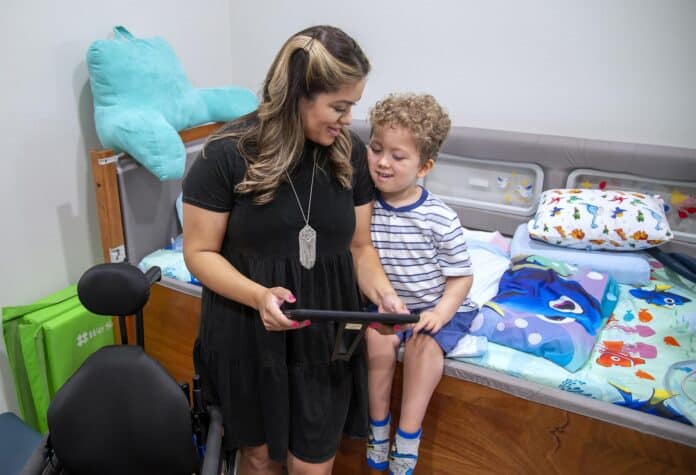HARLINGEN — Kristen Resendez beams with happiness knowing other parents will not have to go through what she and her son Jack went through.
Jack has Spinal Muscular Atrophy and was diagnosed five months after being born. Resendez said she believes if he had been diagnosed earlier, Jack’s progress could have been better. Because of that belief, Resendez and other mothers traveled to the state capitol four years ago to speak to senators to create a bill that would add SMA on the Texas Newborn Screening list.
At the time, Resendez was unaware of how long it would take to have the disease added but she was confident if she advocated for it and helped those fighting it, it would happen. Since June 1, the disease has now been added to the list. Before that, the disease had to be a part of the Recommended Uniform Screening Panel, which is a national guideline.
Resendez said the diseases that are added are only those with treatment and five years ago there was no treatment for SMA. However, now there are three FDA approved medications. Jack was able to get a medical treatment before it was approved because he was involved in a clinical trial.
“1That is the only way he looks the way he does today,” Resendez said.
Jack was born in 2015 and with three weeks of life he stopped moving. Resendez is a single mother and was not able to notice right away he was not doing certain things babies are supposed to. Resendez had two therapists cousins who encouraged her to get him checked and once she did, Jack was diagnosed.
They travel to Dallas almost every month to receive treatment. Resendez said she is aware making a drive so far as well as the financial expenses the disease carries can be a worry for families who cannot afford it in the Rio Grande Valley. Unfortunately, the healthcare Jack needed was not available in the RGV.
Resendez learned through this experience how important it is to be diagnosed early. She explained the way newborn screening works. After the 24 hour mark they do a heel prick and send it to the central lab in Austin where the blood is checked.
“If your baby has any of the diseases being screened in Texas, the state will call the pediatrician and then they will call you,” she said.
“For Jack, if he would have been screened he would have been able to start treatment early. Jack had stopped moving his arms and legs, the ability to eat by mouth and the ability to breathe independently,” Resendez said.
Slowly but surely, once he received treatment, he was able to reverse those conditions.
“His speech is even better than a year ago, I can only imagine how he is going to be in a month,” she said.
Resendez had friends who worked at a children’s hospital in Dallas but Resendez said not everyone has the same luck.
“Newborn screening is going to change what people know about SMA,” she said.
“It is just super exciting. We also have gene therapy which is essentially fixing the gene you are missing. It is really cool … to now have treatments,” Resendez said.
Resendez attends virtual classes and the cure SMA conference where she learns how to take Jack to a swimming pool, learning about people in professional careers with SMA and how to deal with emotional support. Resendez knows a few people in the RGV who have SMA at different levels. She knows there are people who suffer from it in the area.
“Going to the capitol was exciting, I had never called a senator and we forget as citizens, they are there to listen to us, that is their job,” she said.
“I was nervous about who was going to care but they did, they met our kids. The issue was, the (Texas Legislature) floor only meets every two years,” Resendez said.
Two other years had to pass by for the bill to be created, then be funded and finally, train the lab, fund it and train everyone in the state.
“It is a lot of work, which is why it took four years but we met with the Texas health department last week and we gave them our stories so they understand who they are working for and why the urgency is so important,” she said.
For Resendez, it is understandable to feel different negative emotions when a diagnosis is made for a disease such as SMA. However, she hopes with this new bill, parents will take it seriously once that difficult conversation takes place.
“I know how that is when someone tells you something scary but I hope families respond as quickly as they can. I know parents who have kids older than my son who still haven’t accepted the life they live and I get it but it is sad,” she said.
“All we can do is live our lives and hope he has more days. I have always wanted to tell parents of special needs families to not let their children see them sad because then they don’t pursue anything in life,” Resendez said.
In her own words, being sad was not going to help her son. Resendez is thankful for the new opportunities families will have.
“Even being Hispanic, some families don’t want people to know they have a special needs kid. There is a lot of stigma and there shouldn’t be. We were all made to be unique, my son is very happy. The newborn screening will save families,” she said.





